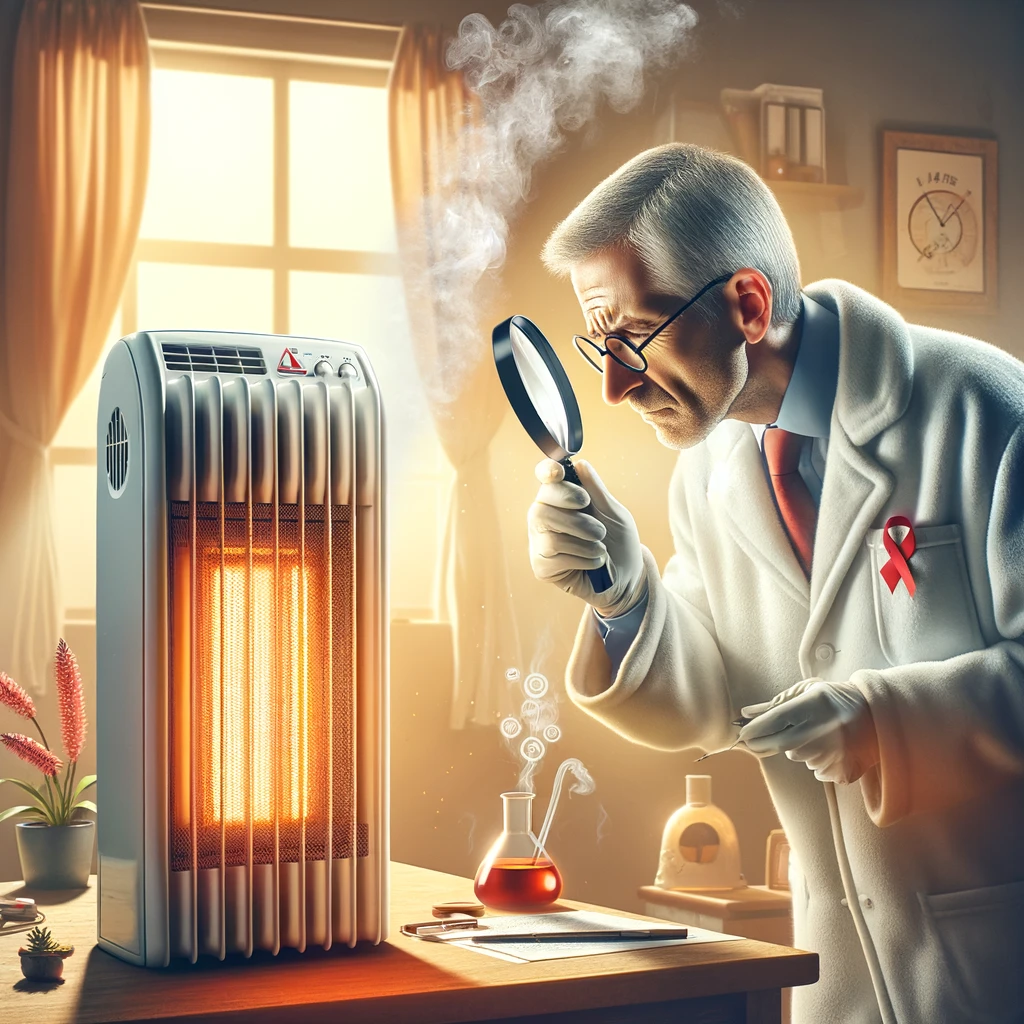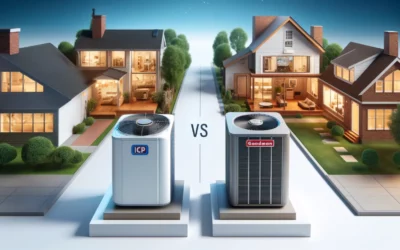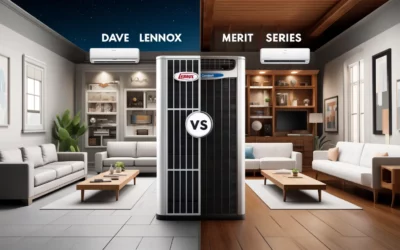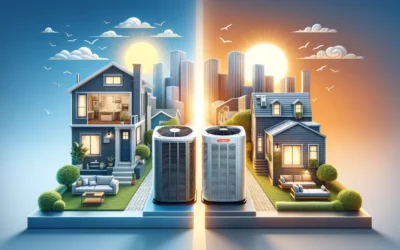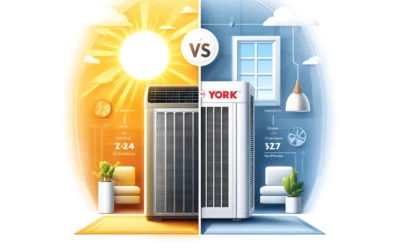Welcome to this informative piece: “Understanding the Initial Smell from your Heater: An Expert’s Insight”. This educational content is tailored to provide you with an understanding of why your heater might emit a certain smell initially when it’s turned on, especially after a long time of inactivity. Written with reference to expert opinion and established facts, we delve into the science behind these smells, disambiguating any fears you may have about your heater’s health. Reading this post will empower you with helpful insights, enabling you to identify when the smell from your heater is normal or when it may indicate a problem that needs professional attention. The aim is to help you ensure your unit’s proper functioning and longevity while ensuring your safety at home. So, let’s dive in for this easy-to-understand, suitable for all experience levels read.
Understanding Why Heaters Emit an Initial Smell
Many homeowners have observed a peculiar smell when turning on their heaters for the first time in the cold season. This can evoke concern, as unexpected odors often raise questions about functionality or even safety. The good news is, there’s usually no need for panic. The smell is typically due to a combination of dust accumulation and the heating elements within the system.So, let’s delve deeper into the causes behind the initial smell from your heater.
Firstly, through summertime and the parts of the year when heaters are not in use, they can accumulate dust and other small particles. When you power up your heater for the first time, this dust gets heated and emits a distinct smell. It is similar to the smell you would notice when turning on your oven after a long hiatus, while it burns off any residual food particles or grease. In most cases, this smell will dissipate as the dust burns off, usually within an hour or so.
- Factors influencing the initial heater smell:
- Dust accumulation: Static electricity produced by the heater during low usage periods can attract dust particles.
- Heating elements: Each heating system (gas, electric, oil, etc.) has a unique way of producing heat, which can result in a distinct initial smell.
- Time of non-use: The longer the period of heater dormancy, the greater the dust accumulation and thus the stronger the smell is likely to be.
| Heater Type | Typical Burning Smell |
|---|---|
| Gas Heater | Slightly sulphurous |
| Electric Heater | Somewhat metallic |
| Oil Heater | Akin to engine exhaust |
Remember, a continuous or worsening smell could indicate a more serious problem, like a malfunctioning part or a carbon monoxide leak. In these cases, it is advisable to consult with a heating system professional.
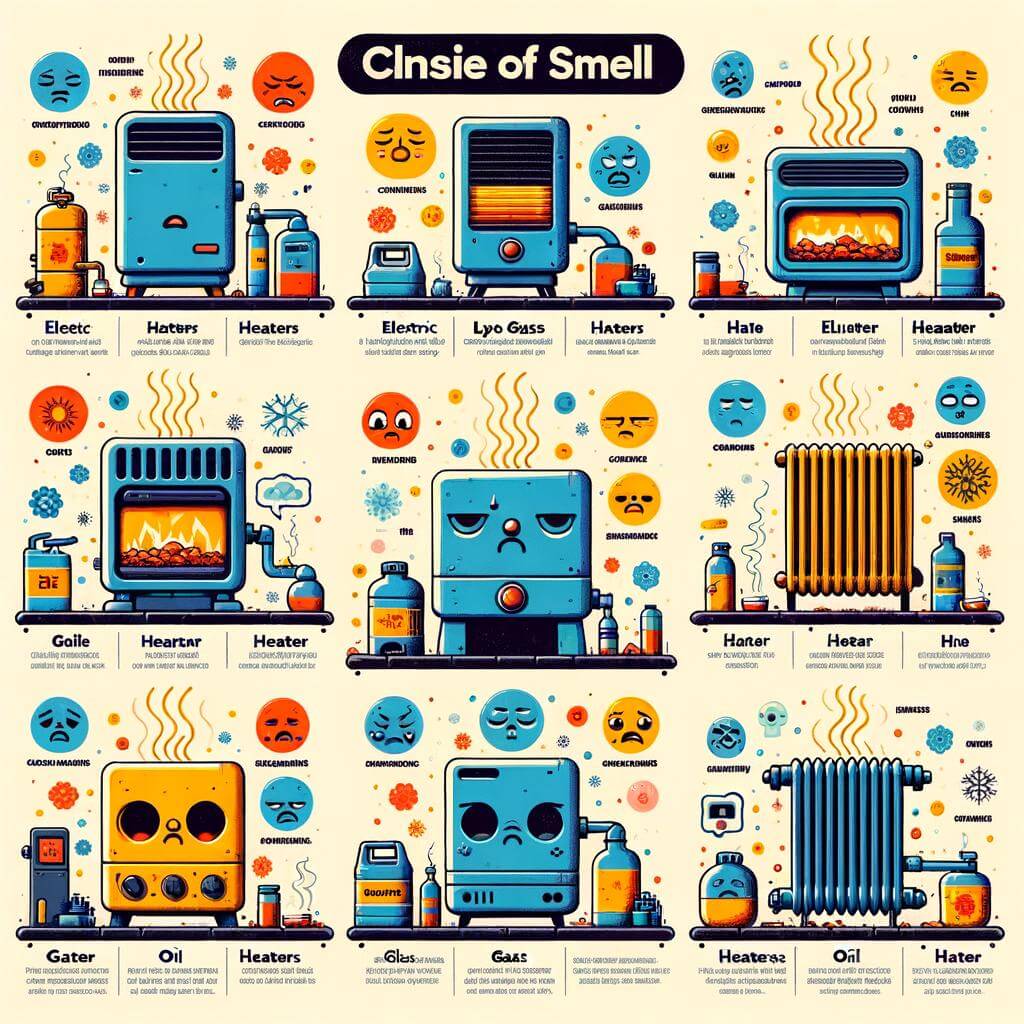
Knowing the Different Types of Heater Smells and Their Meanings
When the cold sets in, a functioning heater is nothing short of a salvage. However, an odd smell from it can raise concerns. Here is what some of these scents could mean:
Burning Dust: After long periods of inactivity, dust might accumulate on the heating elements. When the heater is turned on, this dust burns off, producing a distinct burnt smell. Typically, it should disappear within a few hours. However, if the smell persists, then a more serious issue, like an electrical malfunction, might be at play, warranting immediate attention from a professional.
Metallic Smell: A metallic odor could suggest overheating. It usually means parts of the heater like the heat exchanger or blower motor have gotten too hot. Remember, over time, overheating can cause significant damage to your system. Thus, it is essential to call for a check-up as soon as possible.
The table below provides a summary:
| Heater Smell | Possible Cause | Action Required |
|---|---|---|
| Burning Dust | Dust accumulation on heating elements | If the smell persists, seek professional help |
| Metallic Smell | Overheating of system parts | Request a check-up immediately |
Conclusively, your heater’s smell should never be ignored. It might be a simple issue of burning dust or something much more serious like an electrical malfunction or severe overheating. Hence, always ensure you get your heater checked regularly by a professional for maintenance and safety.
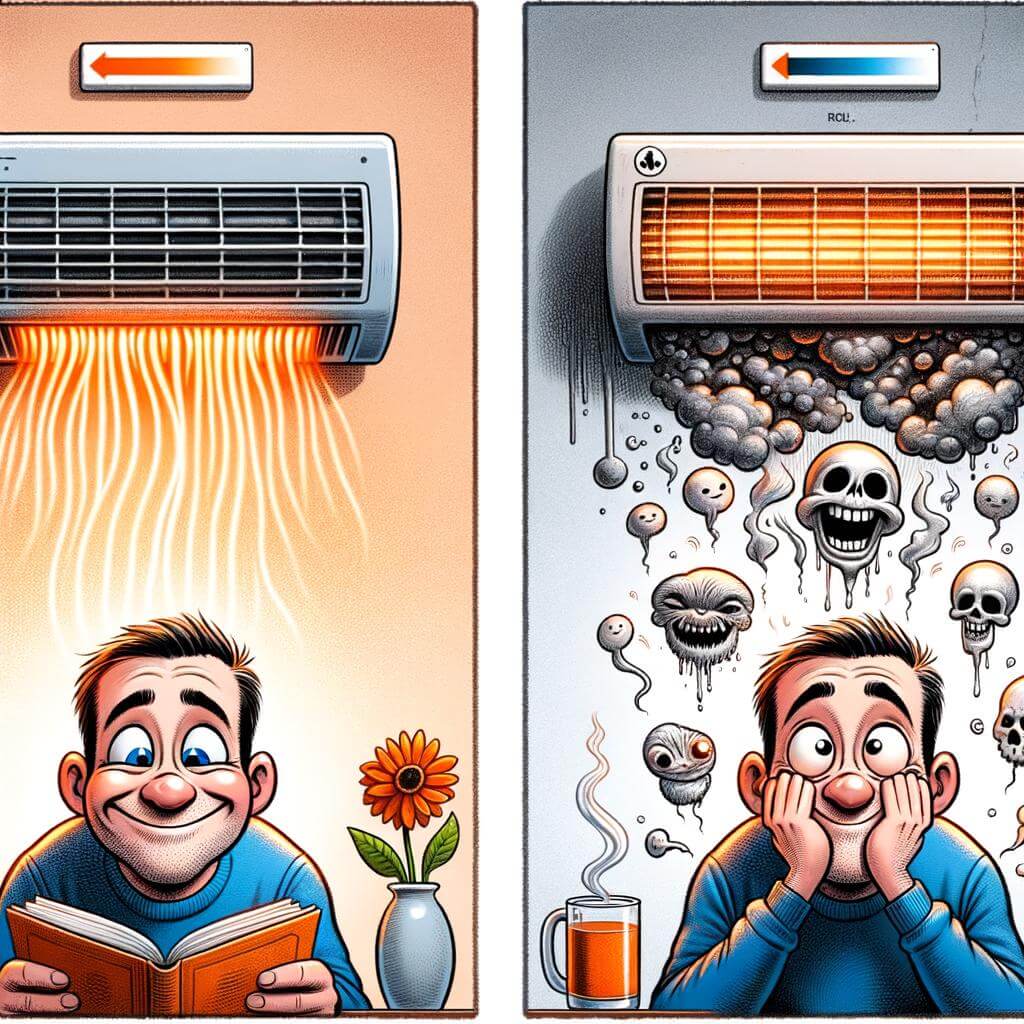
Comparing Smells: Normal versus Potentially Dangerous Heater Odors
At one point or another, we’ve all questioned the faint smell that our heating systems produce when fired up, especially after months of disuse. However, it’s important to understand that not all odors imply an impending problem. Normally, when you first start your heater after a long hiatus, you might catch a whiff of dust burning. This is mainly the dust and tiny particles that have settled on the heat exchanger, burning off as the heater warms up. You might also sense a metallic kind of smell, a typical feature of the hot metal parts inside your heating unit. These smells should dissipate after a few minutes and shouldn’t be a cause for alarm.
| Smell | Description | Severity |
|---|---|---|
| Dusty burning | Typically happens when heating unit is first started after months of disuse | Normal |
| Metallic | Common smell of hot metal parts inside the heating unit | Normal |
On the flip side, there are odors that should prompt you to take immediate action. If you notice a strong, persistent burning smell, it could indicate a serious issue, such as an overheating motor or a wiring issue. An odor akin to hot plastic or rubber could signal that a part of your heating system is melting. The smell of rotten eggs or sulfur can be a critical sign of a natural gas leak. Similarly, an oily smell might be due to an oil leak. These are all situations where you should turn off your heater immediately and arrange for a professional inspection.
| Smell | Description | Severity |
|---|---|---|
| Strong burning | Possible overheating motor or wiring issue | Dangerous |
| Hot plastic | Possible melting part | Dangerous |
| Rotten eggs / sulfur | Possible natural gas leak | Highly dangerous |
| Oily | Possible oil leak | Dangerous |
Being able to differentiate between normal and potentially dangerous odors can contribute significantly towards ensuring the safety and efficiency of your heating system.
Tips on What to Do When You Notice Unusual Heater Smells
Turning on your heater after a long dormant period often brings with it certain smells. Most are innocuous, but some may signal problems. Here are some tips and insights. Sulphurous or rotten egg smell could mean an unlit pilot light or a gas leak. If it’s the latter, evacuate and call your gas company immediately. A quick whiff of a burning smell is normal upon first use as dust burns off, but continued scent might indicate an overloaded circuit or wiring issue.
If you notice a chemical smell, it may mean the heater’s heat exchanger has cracked, leaking carbon monoxide – call a professional immediately. Mildew or musty smells could be due to mould in your system, requiring a cleaning. The smell of oil signifies an oil leak, possibly needing a professional repair. Here’s a summary of the possible causes and associated actions:
| Smell | Possible Causes | Action |
|---|---|---|
| Sulphurous / Rotten Eggs | Gas Leak / Unlit Pilot Light | Evacuate & Call Gas Company |
| Burning | Overloaded Circuit / Wiring Issue | Call Professional |
| Chemical | Cracked Heat Exchanger | Call Professional |
| Mildew / Musty | Mould in System | Clean System |
| Oil | Oil Leak | Call Professional |
Don’t ignore unusual heater smells. Acknowledging these warning signs can help you maintain your heating system, ensuring its longevity and your safety.
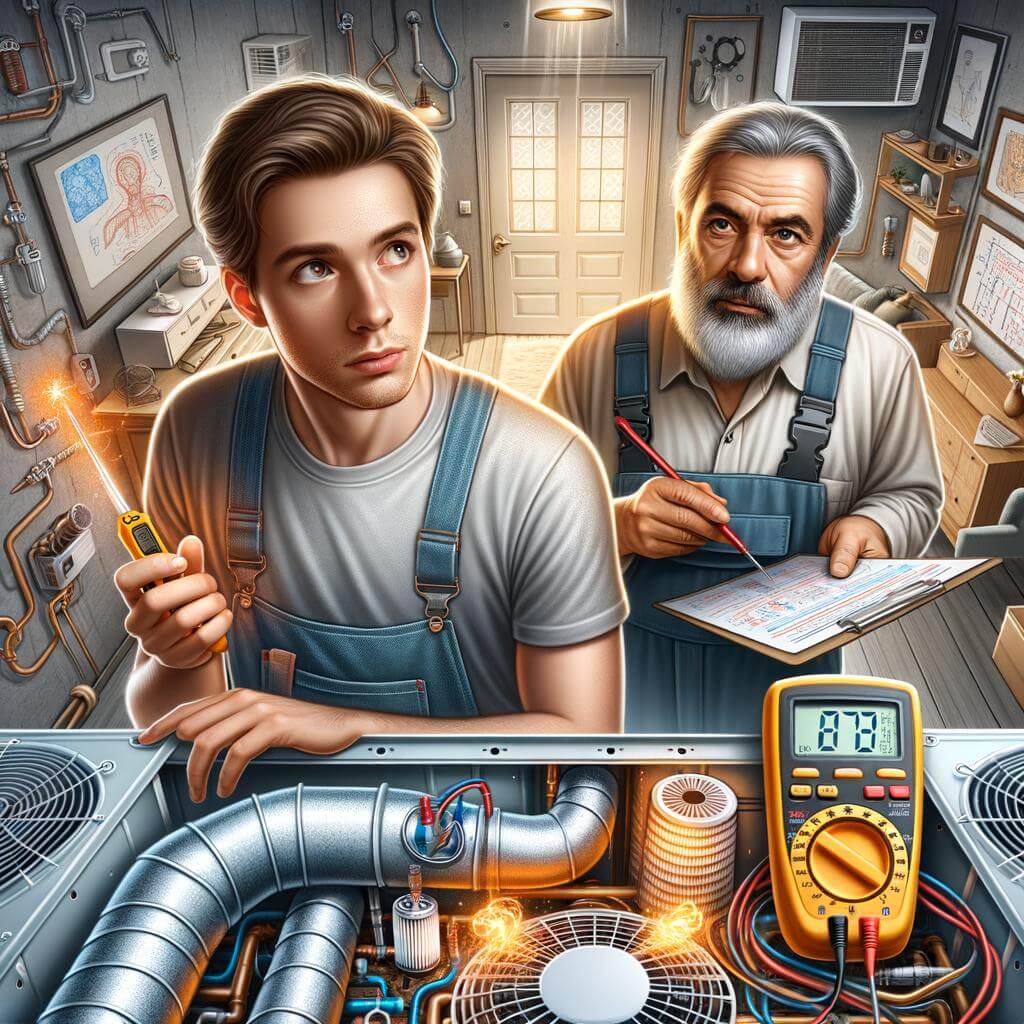
Seeking Professional Help: When and Why You Might Need an HVAC Expert
It’s a common experience for homeowners – you turn on your heater for the first time when the colder months set in, and suddenly there’s a peculiar smell permeating throughout your house. This smell can sometimes be no cause for concern, however, there are certain instances when contacting a HVAC professional for assistance might be necessary. Understanding the key signs and causes of these smells can help you make that decision.
One instance where you might need the help of an HVAC expert is when the initial smell from your heater does not dissipate after a few hours. This could indicate a variety of issues, including a dirty filter, dust accumulation in your heating system, or potentially more serious problems that require professional attention. In addition, if you notice a sharp, pungent or burning smell, this could be indicative of mechanical problems with your heating system like overheating, which certainly warrants a call to an HVAC professional.
| Smell | Possible Cause |
|---|---|
| Dusty or musty | Dust accumulation in the heating system |
| Sharp or pungent | Mechanical issues or overheating |
| Burning | Overheating, filter issues, or serious furnace problems |
Ignoring these smells can lead to bigger problems down the line, affecting not only the efficiency and longevity of your HVAC system but also creating potential safety issues. Regular maintenance and getting your system checked by a professional can prevent these problems from occurring, ensuring that your heating system is safe, functional, and ready to keep your home warm during those colder months.
Maintaining Your Heater: Expert’s Advice for a Safer and Odor-Free Heating
Most individuals associate the initial smell from new heaters or even when a heater is first turned on for the season, as normal. However, an expert would argue that it is imperative to understand the cause behind this distinctive smell to ensure your heater isn’t weeping for help. Starting with simple causes, a dusty heater can emit a mild odor. If dust and other tiny materials have collected on the heater’s surface over months of no use, they burn-off and produce a smell when you turn the heater on. This is, typically, harmless and the smell should clear out after a couple of hours.
If the smell survives longer than expected, certainly something is not right. Some other possible culprits behind the pungent odor can be a broken component producing smoke, a gas leak, or even an electrical problem, all of which require immediate attention! A personal inspection can help maintain your heater’s health. For instance, see if there is any visible smoke or abnormal sounds from the heater to cross out the issue of any broken part. Also, make sure to check your heater’s filter. A clogged or old filter can cause a smoky odor, visually inspect the filter and change it if needed.
| Causes of Heating Smell | Solutions |
| Dusty Surface | Allow it to run for a couple of hours and see if the smell clears |
| Broken Component | Contact a professional heating technician |
| Gas Leak | Immediately switch off the heater and reach out to a local gas company |
| Electrical Problem | Switch off the heater and hire an electrician |
Final Thoughts
In conclusion, the initial smell from your heater can be a benign mystery that dissipates quickly, or it could serve as a prelude to a bigger problem that demands immediate attention. Understanding these smells and their causes, as illuminated in this article, could save you from unnecessary panic and could even prevent potential danger. Stay tuned to the smells and sounds of your home appliances, especially negligible ones like your heater, as it provides insightful clues to their state of functionality. Nobody knows your home better than you do. With the understanding you now have, you’re better equipped to take necessary action when the need arises. Remember, while it’s okay to attempt troubleshooting minor issues on your own, expert intervention is always advisable whenever uncertain. After all, the purpose of these insights is not necessarily to turn you into a DIY expert overnight, but to empower you with the knowledge to make informed decisions about your appliance’s health and safety. On that note, here’s to a safe, warm, and risk-free winter! Remember, knowledge is power, but a timely response is key!

